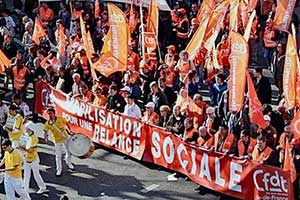Demanding jobs, higher wages, price rollbacks
Three million French workers strike
By
G. Dunkel
Published Mar 26, 2009 8:19 PM
Workers in huge numbers took to the streets on March 19 in 219 cities and towns
throughout France. The unions that called this one-day strike/protest counted
more than 3 million workers who participated. Many small towns and cities,
where protests are rare, saw record turnouts.
The protesters want the government to protect their jobs in the face of rising
unemployment and outsourcing of manufacturing. They want the money now going to
banks and financial institutions to go instead for a higher minimum wage. They
want high prices for housing, transportation and energy rolled back. They want
the government to start bargaining around these issues.
In Marseilles, the second-largest city in France, more than 300,000 people
marched—a record. Paris had at least 350,000 demonstrators. In some towns
in western France, more people protested than live in the towns, as workers
came from miles around to express their anger.
An unusually large proportion of the strikers were from private companies and
generally do not take part in strike days. Even IBM-France, Hewlett Packard and
the payroll processing company EDS had worker contingents.
Substantial numbers of train drivers, dockworkers, postal workers, teachers,
university professors and students, municipal employees, car makers, oil
workers, supermarket cashiers and many other professions all walked out.
The Web site of the CGT—one of the leading French trade union
confederations—had a number of reports about nonunion workers in very
small companies filling out the legal forms required to exercise a French
worker’s constitutional right to strike.
This turnout showed a significant increase from the last one-day strike on Jan.
29. An opinion poll by BVA showed 74 percent of the French public supported
this action.
The day of the protest, French president Nicolas Sarkozy went to Brussels for a
meeting on the economy and avoided making any statements. François Fillon,
the prime minister, stayed in Paris and stated, “I hear the protesters.
Their concerns are legitimate.” But, he added, “Mobilizations will
not resolve the crisis. The government has the duty to be responsible.”
(Le Monde, March 20) He rejected a new stimulus plan, saying, “We have
doubled the deficit this year. We cannot go beyond that.”
According to a statement of the New Anticapitalist Party (NPA), Fillon is the
designated voice of neoliberal rejection of any change in France’s
economic policies. The head of MEDEF, France’s big-business association,
and the head of the UMP, Sarkozy’s party, lead the charge while Fillon
applies the final rejection.
The eight union confederations that called the strike met March 20 to plan for
further actions but delayed any decision until another meeting, to be scheduled
before the end of March. They want to conserve their impressive unity in the
face of the government’s attempt to split them, but realize that the
government has no intention of opening up any discussions on the unions’
social programs. There are also some significant contested elections for work
councils, in which each union confederation runs a slate, coming up the last
week of March, which will give a clearer idea about the mood of the workers and
where they want to go.
May 1, a legal holiday in France, is likely under consideration for another day
of action in the streets, according to some French journalists.
Olivier Besancenot, spokesperson for the NPA, responding to the question of
what to do next and how to get the government to start negotiating, issued a
call for an indefinite general strike, as was done in Guadeloupe.
Compared to the French Communist Party, the NPA is not a very large party on
the French left. And both the CPF and the NPA are small compared to the major
bourgeois parties. But Besancenot, according to a poll conducted by BVA, has as
much French public opinion supporting him as supporting Sarkozy. Le Figaro, the
leading conservative newspaper in France, published an interview with
Besancenot March 16 in which he charged Sarkozy with having “a
class-based policy,” with “celebrating an outmoded entrepreneurial
capitalism” and with taking an extravagantly expensive vacation in
Mexico.
The struggle in France is intensifying.
Articles copyright 1995-2012 Workers World.
Verbatim copying and distribution of this entire article is permitted in any medium without royalty provided this notice is preserved.
Workers World, 55 W. 17 St., NY, NY 10011
Email:
[email protected]
Subscribe
[email protected]
Support independent news
DONATE


